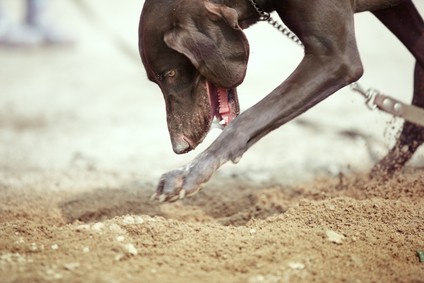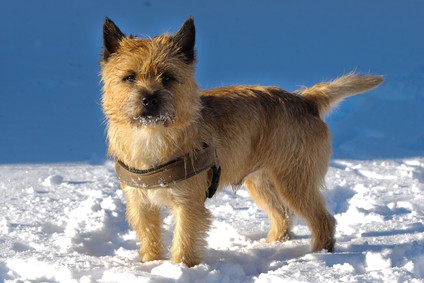So, you see your dog digging a hole in your newly planted garden. What’s your first instinct? If you’re like most people, it’s probably to rush to the scene of the crime and yell at him to stop.
While this may turn his attention away from his excavation efforts in the short term, it won't be long before he is again hard at work.
The best way to put a stop to this unwelcome behavior is to work out what’s causing your dog’s digging and deal with it appropriately.
Why Do Dogs Dig? (12 Reasons)
There are any number of reasons for dog digging. The following is a list of the 12 most common.
1. Lack of Exercise
If your dog is an active breed, chances are she’s digging because she’s not getting enough exercise.
Any active breed left alone for too long will find something to do; you can count on it. And you won’t always like what they come up with.
But any dog can and will dig if it doesn't get the exercise it needs. Adequate exercise is so critical to a dog’s contentment and mental health that it’s the key to many (if not most) problematic dog behaviors. Digging is no exception.
2. Boredom
If there isn't much for your dog to do while you're out at work all day, again, don't be surprised if he makes his own entertainment.
This often includes digging, but he may also chew things and pull laundry off the washing line.
3. Lack of Attention
Dogs often dig due to a lack of attention.
If they're left outside for long periods, digging may be the most convenient way to let you know that you need to find more time for them.
All dogs need positive attention from their families, and digging is only one of the nuisance behaviors they might use to try to get it.
They may also chew, bark incessantly, or be generally destructive.
4. Instinct
Some breeds, particularly the Dachshund and most terriers, are hard-wired to dig.

They were bred to go to ground after small prey, and digging is instinctive. Humans have little need for vermin hunting today, but these dogs have retained the instinct to dig.
5. Confinement
Some dogs just want to escape their yard. The intact Casanovas of the dog world, for example, dig to escape. They can smell a female in heat up to three miles away and will dig until they’re exhausted to get to her.
6. Loneliness
Dogs are pack animals who aren’t made to be alone. If your dog is left outside by himself all day long, he will find something to do to distract himself. Digging is perfect for this.
7. Comfort
In warm weather, your dog may dig a shallow hole to lie in because the ground just under the surface is much cooler.

Spitz-type dogs, such as huskies and Chow Chows, are known for this. They have thick coats that can be too heavy for hot summer weather.
Some dogs will do this in the winter for the opposite reason—the ground temperature is warmer than the air. Dogs can also dig to try to find water.
If she lies in the holes that she digs, your dog is probably digging for comfort.
8. Separation Anxiety
Digging and destructive behavior, both inside and outside your home, can be characteristic of separation anxiety, especially in the companion breeds. But other breeds are prone to it, too.
9. Hunting Prey
Dogs sometimes dig in search of insects or other prey that runs on the ground or underground.
This is classic behavior for some scent hounds. They may smell small animals burrowed in the ground.
The Bassett Hound, Beagle, and Bloodhound, for example, will dig up chipmunks, rabbits, gophers, moles, or ground squirrels.
10. Pica
Pica is an urge to eat abnormal materials such as dirt and soil. Your dog may dig up the ground before he eats it.
11. For Food
We know of at least one breed that digs for food—not for himself, but for humans.
The Lagotto Romagnolo has the traditional job of sniffing out and digging for truffles.

12. Burying or recovering treasure (caching)
Dogs will often dig holes to bury bones. This behavior is called caching. There are four reasons why dogs will cache bones and other treasures.
- It’s a survival instinct. In the wild, dogs learned that there were times of feast and times of famine. When hunting was good, they preserved food by burying it. When food was scarce, they would return to the holes and retrieve the bones they had hidden earlier.
- Today, when a dog is well-fed, he may bury bones simply because he’s full. He buries it to protect it from other animals so he can have it later.
- Out of boredom. Sometimes dogs will bury bones and cover them up because they want you to find them.
- For entertainment—it’s fun! Sometimes dogs will cache treasures inside, just for fun. They will “bury” something deep in a chair or in the folds of a blanket, for example.
As another example, have you ever put your foot into a shoe and discovered a foreign object in there? Your dog is the likely culprit, inviting you to a game of hide-and-seek.
We’ve even heard an owner story about a Yorkshire Terrier who used to dig “tootsie rolls” from the cat’s litter box and hide them all over the house!
How Do I Stop Dog Digging? (15 Ways)
Most important: Do not punish your dog for digging!
There are as many ways to stop dog digging as there are reasons for digging. But one thing we know for sure is that punishment doesn’t work.
The American Society of the Prevention of Cruelty to Animals (ASPCA) writes that punishing is not likely to solve the problem.
That’s because most dogs enjoy digging enough to continue, even if it results in negative consequences. It’s a natural part of being a dog.
Worse, several studies have found that punishing a dog often causes more behavioral problems and less obedience.
Other studies have found that punishment-based training leads to stress and anxiety in dogs and weakens the bond they feel toward their owners.
Okay, so no punishment. But what does work?
We’re glad you asked! Following is a pretty broad list of things people have found worked for them.
Not all of these will work for all dogs in all situations, but you should be able to find a suggestion or two that might work for you and your dog.
1. Keep your dog inside
The easiest way to stop dogs from digging is also the simplest. Keep your dog indoors unless she is supervised outside.
You will then be able to catch her in the act of digging and react appropriately.
2. Contain your dog in the yard
If leaving him inside is not a possibility for you, the next best thing is to use a large kennel or pen. Build it on a concrete slab or another surface that he can’t dig through.
When you leave your dog in his pen, be sure to leave his favorite toys to help him stay busy.
3. Spend more time with your dog
A study was done in 2003 (reported by Frontiers in Psychology) on the relationship between time owners spent with their dogs and dog behavior problems.

The study found that for many behavioral problems (like digging, but also chewing and escaping), the lower the time that owners spent with the dogs, the more problem behaviors were reported.
So if your dog is an attention digger, find a little more time each day to interact in ways your dog enjoys.
This small investment could go a long way toward reducing nuisance digging. It would also help with any other behavioral problems you may have with your dog.
4. Be sure your dog is getting enough exercise
Exercise is so critical to dog behavior that it is at the root of many behavioral problems. Digging could be your dog’s way of telling you that she doesn’t have enough opportunity to burn off energy.
Try playing with your dog more during the times that she’s inside. Bring her outdoors as often as you can for games of fetch or Frisbee. Add an extra walk to her daily schedule.
If you don’t have time to do this yourself, consider hiring a neighborhood teen to do it for you.

If lack of exercise is the reason she's digging, let her burn as much energy as she can in ways that are acceptable to you. She will no longer need to find ways to burn excess energy on her own.
5. Keep your dog occupied and engaged
Dogs that dig out of boredom need mental stimulation, especially when they’re alone.
Your dog might appreciate food-dispensing toys when no one’s around. Consider a Kong Wobbler or a Buster Cube to make his breakfast kibble last a lot longer.
Long-lasting chews, both organic and synthetic, can also be good choices to distract a dog for a while.
Interactive toys may help as well, such as an automatic ball launcher or a tug-of-war rope attached to a pole.
6. Find your dog a friend
If you think your dog may be lonely, perhaps you can arrange to exchange dog-sitting duties with a friend or neighbor so both dogs have company.
Dogs are pack animals, and many of them do better with at least one other dog.
If you can’t arrange that, you may be able to budget for a day or two every week at a doggie daycare center.
Or you could consider adopting another dog yourself. This is probably the best thing you could do for a dog that’s home alone all day, inside or out.
7. Have your male neutered
Neutering should stop your dog if he is only digging to track a female in heat.
8. Create a shaded area
If the reason your dog is digging is that he's feeling the heat, give him a comfortable bed in a shady spot, so he doesn't need to dig holes to find a cool place to lie in.
9. Move 'em out!
For those dogs who dig because they’re hunting, moles are common prey.
If you have moles in your yard, they’re most likely there because you also have grubs, which moles consider very tasty.
Treat your yard for grubs and the moles will find another source of food, hopefully far away from your yard.
If your dog is more likely to be hunting chipmunks or squirrels, there are at least two options you can try.
- One is a spray repellent designed to keep small animals from your yard or garden. (Be sure to read the packaging carefully for any product you treat your yard with to be sure it’s safe for your dog.)
- If that option doesn’t appeal to you, Havahart traps may be the answer. Simply trap and relocate.
As a final option for controlling critters in your yard, you might try fencing off areas where you know small animals to be active so your dog can’t get to them.
10. Watch what your dog is eating
If the holes your dog is digging are especially deep, he may be caching. Dogs in the wild learned that the deeper they dug their holes, the safer their food was.
To prevent caching in your yard, don’t give your dog bones or other foods that he won’t eat right away.
If he doesn’t finish eating something, he may try to bury it to save it for later. Take it away before he has an opportunity to cache it.
11. Try dog digging repellents and deterrents
Natural Repellants
- Some experts recommend placing cayenne pepper, orange peels, or vinegar in their favorite digging areas. But DO NOT USE ONIONS! You may have heard or read recommendations to fill dig holes with onions, but according to the American Kennel Club (AKC), all parts of the onion are toxic to dogs.
- Partially bury flat rocks in his favorite dig spots.
- Try planting thorny or prickly bushes as a boundary to keep your dog out of digging areas.
- This idea won't be for everyone, but some people recommend placing your dog's own feces in the holes he has dug. Some people swear that this keeps dogs away but caution that it has to be his own; feces from other dogs won’t faze him.
Other Deterrents
- Set up a sprinkler in the area.
- Try retail repellant products. Some are designed to deter wildlife, as noted above. Others are made to deter dogs and cats from areas where you don’t want them digging. The effectiveness of these products will vary with individual dogs, and you may have to reapply them every time it rains.
- You might also try a behavior correction spray. This only works at close range, however, so you need to be present to catch your dog in the act.
- If all else fails, you may want to try a remote training collar. These used to be called “shock collars,” but many dog trainers take exception to that. The “shock” your dog gets is meant to be gentle enough to not be painful. The idea is to use the minimal possible to get her attention.
Like correction spray, you would need to be close enough to your dog to see her digging. You would also have to keep your dog away from the digging location when you’re not there to catch her in the act.
12. Escape-proof your yard
If you have an escape artist (or an escape artist wannabe), consider the following tips from the Humane Society of the United States to stop a dog from digging under a fence.
- Try burying chicken wire along the base of the fence, being sure to roll sharp edges away from your yard.
- Line the bottom of the fence with large, partially buried rocks.
- If you’re putting up a new fence, bury it a foot or two below ground level.
- Anchor chain-link fencing to the bottom of the fence at ground level. This will make the surface uncomfortable for your dog to walk on.
- With any of these ideas, also work on appropriate behavior modification tips suggested above.
13. Create a dedicated digging area
Here's one from the “if you can't beat 'em, join 'em” school of thought.
Franklin D. McMillan, DVM, of Best Friends Animal Society, lists “digging things up” as one of the happy experiences that dogs need for their mental health.
Why not give him a “sanctioned” place to do it? Try building a sandbox where your dog can dig to his heart’s content.
Depending on how involved you want to get in the project, there are several ways you can approach it. The simplest may be to get a child’s sandbox or wading pool and fill it with sand.
You could also section off a portion of your back yard that is “his.” Build it up with 2 x 4’s if you like and add sand, or just let him dig as is. If you would like a more complex DIY project, there are plenty of sandbox plans online.
Whichever option you choose, bury treats or his favorite toys and let him go. You may want to keep the sand damp, as many dogs prefer that.
A great benefit of the sandbox idea is that you have an approved option to gently redirect him to anytime you see him digging in an off-limits spot. When he accepts the redirect and begins to dig in his own spot, reward him (and yourself!) for a job well done.
14. Research separation anxiety
If your dog digs because of anxiety, you may have to do a little more work to get to the bottom of it. Is it separation anxiety?
Chances are good that it is if your dog is a companion breed and spends time outside by himself. We don't recommend this for companion breeds such as the Shih Tzu, Pekingese, Yorkshire Terrier, and many others.

But any dog can suffer from separation anxiety, and we address this issue in our breed articles.
To find out if your dog is especially prone to it, do a quick search of our site for your breed.
If you think your dog’s issue may be separation anxiety, a good place to start looking for help would be our articles on this topic:
- Separation Anxiety in Dogs: What Signs and Symptoms to Look For?
- Tips to Prevent Separation Anxiety in Dogs
- Training Tips to Eliminate Separation Anxiety in Dogs
- Helpful Medication to Treat Separation Anxiety in Dogs, recommended for extreme cases.
15. See a vet
Some dogs suffer from more generalized anxiety that you may not be able to manage on your own. If your dog is digging because of anxiety that comes from fear or prior abuse, for example, his digging could be compulsive.
You may want to consult your vet or a dog trainer or behaviorist for help on how to deal with anxious dog digging.
They will help you to discover the source of your dog’s anxiety. If you only work at stopping the digging, then you're not tackling the underlying problem, and you aren't likely to be successful.
Which Dogs Dig the Most?
There are many reasons for dogs to dig, and most dogs will dig at least occasionally. But some breeds are more likely to dig than others.
If you’re considering a new dog and don’t want a dog that digs, here are some breeds you may want to avoid.
- Cairn Terrier
- Bedlington Terrier
- Dachshund
- Bassett Hound
- Parson Russell Terrier (formerly Jack Russell Terrier)
- Beagle
- Bloodhound
- Siberian Husky
- Border Terrier
- Chow Chow
- Miniature Schnauzer
- Wirehaired Pointing Griffon
- Alaskan Malamute
- West Highland White Terrier (Westie)
- Australian Terrier
- Petit Basset Griffon Vendéen
- Lagotto Romagnolo
- Airedale Terrier
- Border Collie
Conclusion
Digging is a natural behavior for dogs. For that reason, it can be hard to eliminate.
You may want to start by making sure your dog's exercise and attention needs are being met.
These are two of the most common factors that drive problem dog behaviors.
If that doesn’t seem to be the case with your dog, with all the suggestions given here, you’re sure to find one or two dog digging solutions that will have you saying, “Hot diggity!”

Calvin is the co-founder and one of the main contributors to dogtemperament.com. He has been an avid dog lover all his life. He enjoys researching and sharing great ideas on how you can avoid common pitfalls of dog ownership and build the most loving and enjoyable relationship with your dog.



